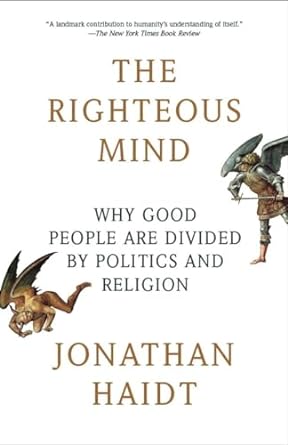More on this book
Community
Kindle Notes & Highlights
Read between
July 5 - July 17, 2023
when a group of people make something sacred, the members of the cult lose the ability to think clearly about it.
If you really want to change someone’s mind on a moral or political matter, you’ll need to see things from that person’s angle as well as your own.
extreme partisans are so stubborn, closed-minded, and committed to beliefs that often seem bizarre or paranoid. Like rats that cannot stop pressing a button, partisans may be simply unable to stop believing weird things. The partisan brain has been reinforced so many times for performing mental contortions that free it from unwanted beliefs. Extreme partisanship may be literally addictive.
it’s so important to have intellectual and ideological diversity within any group or institution whose goal is to find truth
Moral matrices bind people together and blind them to the coherence, or even existence, of other matrices. This makes it very difficult for people to consider the possibility that there might really be more than one form of moral truth, or more than one valid framework for judging people or running a society.
morality is like cuisine: it’s a cultural construction, influenced by accidents of environment and history,
Political parties and interest groups strive to make their concerns become current triggers of your moral modules. To get your vote, your money, or your time, they must activate at least one of your moral foundations.
We humans have a dual nature—we are selfish primates who long to be a part of something larger and nobler than ourselves.
“To invest social conventions with sanctity is to hide their arbitrariness in a cloak of seeming necessity.
Irrational beliefs can sometimes help the group function more rationally, particularly when those beliefs rest upon the Sanctity foundation.33 Sacredness binds people together, and then blinds them to the arbitrariness of the practice.
Moral systems are interlocking sets of values, virtues, norms, practices, identities, institutions, technologies, and evolved psychological mechanisms that work together to suppress or regulate self-interest and make cooperative societies possible.
genes (collectively) give some people brains that are more (or less) reactive to threats, and that produce less (or more) pleasure when exposed to novelty, change, and new experiences.19 These are two of the main personality factors that have consistently been found to distinguish liberals and conservatives.
The human mind is a story processor, not a logic processor.
When asked to account for the development of their own religious faith and moral beliefs, conservatives underscored deep feelings about respect for authority, allegiance to one’s group, and purity of the self, whereas liberals emphasized their deep feelings regarding human suffering and social fairness.
if you are trying to change an organization or a society and you do not consider the effects of your changes on moral capital, you’re asking for trouble. This, I believe, is the fundamental blind spot of the left. It explains why liberal reforms so often backfire,43 and why communist revolutions usually end up in despotism. It is the reason I believe that liberalism—which has done so much to bring about freedom and equal opportunity—is not sufficient as a governing philosophy. It tends to overreach, change too many things too quickly, and reduce the stock of moral capital inadvertently.
...more
We’re all stuck here for a while, so let’s try to work it out.


